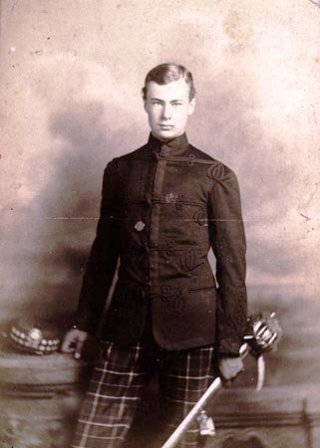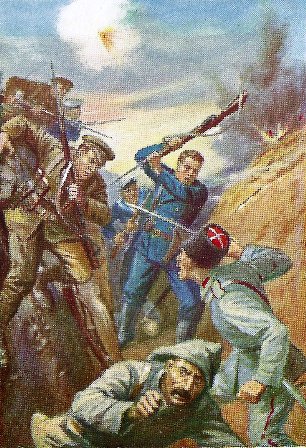13 July 1915
HELLES - Major-General Granville Egerton, Headquarters, 52nd Division - "I contend that the Battle of July 12-13th was due to a complete want of a true appreciation of the situation. If the conception of the battle was wrong the tactics of the action were far worse. The division of the attack of two Brigades on a narrow front into two phases, no less than 9 hours apart, was positively wicked."
 Photograph: Major-General Granville Egerton commanding the 52nd Division back in his prime as a young Second Lieutenant before joining the 72nd Regiment of Foot at Kabul, 1879. He took part in the famous march from Kabul to Kandahar where the British defeated the Afghan army under the command of Ayub Khan in 1880. Egerton was severely wounded at Kandahar, but recovered to resume his military career which extended beyond the Great War. He died in 1951. A fascinating man and although he may have been thought of as old and past it by young Alfred Chater (as an old man in need of his nap when Chater met him in our quote selected for 12 July) but Egerton's assessment of the planning for the Battle of 12-13th July was cogent and damming of the failings of Hamilton and Hunter-Weston.
Photograph: Major-General Granville Egerton commanding the 52nd Division back in his prime as a young Second Lieutenant before joining the 72nd Regiment of Foot at Kabul, 1879. He took part in the famous march from Kabul to Kandahar where the British defeated the Afghan army under the command of Ayub Khan in 1880. Egerton was severely wounded at Kandahar, but recovered to resume his military career which extended beyond the Great War. He died in 1951. A fascinating man and although he may have been thought of as old and past it by young Alfred Chater (as an old man in need of his nap when Chater met him in our quote selected for 12 July) but Egerton's assessment of the planning for the Battle of 12-13th July was cogent and damming of the failings of Hamilton and Hunter-Weston.
"It seems to me that the fighting of this battle was premature and at the actual moment worse than unnecessary - I submit that it was cruel and wasteful. The troops on the Peninsula were tired and worn out; there were only two Infantry Brigades, the 155th and the 157th, that had not been seriously engaged. It was well known to the higher command that large reinforcements were arriving from England and a grand attack was to be made at Suvla. Was it not therefore obvious that the exhausted garrison at Helles should be given a fortnight's respite and that the fresh attacks from that position should synchronise with those at Suvla and Anzac? I contend that the Battle of July 12-13th was due to a complete want of a true appreciation of the situation. If the conception of the battle was wrong the tactics of the action were far worse. The division of the attack of two Brigades on a narrow front into two phases, no less than 9 hours apart, was positively wicked."
 Chief Petty Officer J. W. Johnstone, Armoured Car Squadron, RND
Chief Petty Officer J. W. Johnstone, Armoured Car Squadron, RND
Overnight the troops in the newly captured Turkish trenches faced the hard graft of consolidation. Trenches had to be turned round, old communication trenches barricaded off, new communication trenches dug back to the old British front line, the wounded had to be evacuated and supplies brought up. All this against a backdrop of chattering machine gun fire, flares and shrapnel bursts.
Picture from the wonderful fitional book Dick Valiant in the Dardanelles by Lieutenant Commander John Irving. I think if gives us some vague idea of some of the tension in the following quote.
That night Chief Petty Officer F. W. Johnstone was sent up to find a position for his RNAS machine gun team. When he reached the new front line he could see the scale of the problems faced.
"What a state it was in! Long stretches of parapet had been blown away leaving deep and dangerous holes, the floor was strewn with many dead ... The trench had been hewn out of an extremely rocky substance and was not more than three feet deep. Where our shells had wrecked it, or blown the parapet in, it became as shallow as one foot. The 4th Royal Scots who manned the part wherein my gun was to be placed were in a thoroughly exhausted state. They had been without water all day."
While Johnstone was awaiting the arrival of his machine gun the Turks attacked.
"I was terrorised by the shout "Here they come". The counter attack! I looked into the darkness and there sure enough were the black shapes of men. I had often wondered whether I would experience this present sensation, but never expected it to happen at a time when I would be without my gun. All along our line the exhausted troops - now superhuman - blazed away into the dark line."
Armed only with a revolver Johnstone decided to keep his head down.
"I heard the Turkish priests calling to God - Allah! Allah! Allah! and then a scuffle in the traverse to my left, told me that at least some of the enemy had forced an entry. I waited a moment or two, my heart thumping and eyes wide open trying to pierce the awful darkness. Nothing happened, no huge figure jumped upon me and no rifle blazed point blank. I could see to my right a mass of struggling men - What was happening? Rifles were going off in all directions; the dull red flash increased in brightness by the intense darkness. Yells and screams interrupting the weird chanting of the priests. Terribly excited I crouched against the wall - figures passed, some dropped and I could make nothing of it. It seemed much longer but after ten minutes or so the figures of reinforcements could be discerned on the other side of the trench. Scrambling down, they threw themselves into the fray, but all I could see was a mass of indistinct figures struggling among themselves. Still crouching I moved from off the body I had been all the while sitting upon and laid myself full length beside it. Suddenly from out of the darkness a figure rushed down on me - at once I knew I was hit, but the figure above me had ceased to move and easing myself I saw that the body was that of a British officer. His rifle laid across my hand; its bayonet had pricked my arm as it fell. Along the trench I saw dark figures upon the parapet and others scrambling up its side. The Turks in retreat! A sheet of flame was poured into the thin line and very few ever regained their own trench. "
The troops at Helles were now almost finished.
"SOURCE:
IWM DOCS: G. G. A. Egerton, Typescript account, p.2-3, IWM DOCS, Johnston, diary, 13/7/1915
